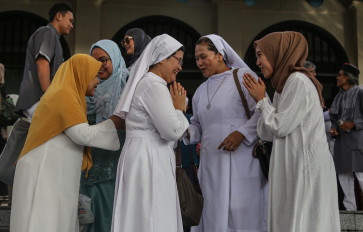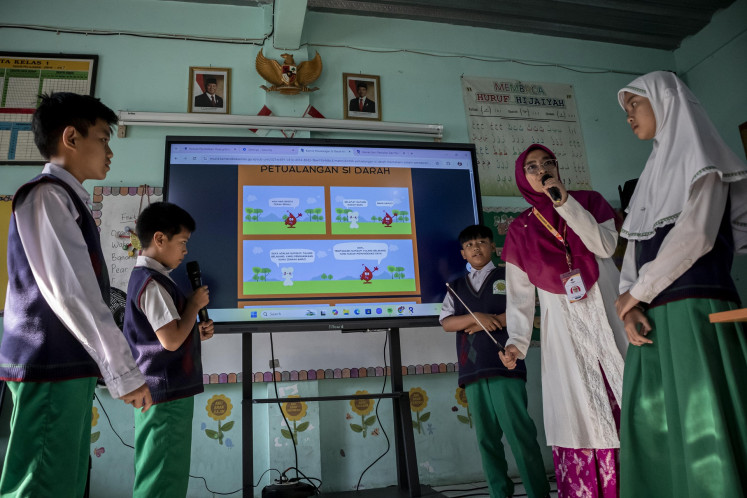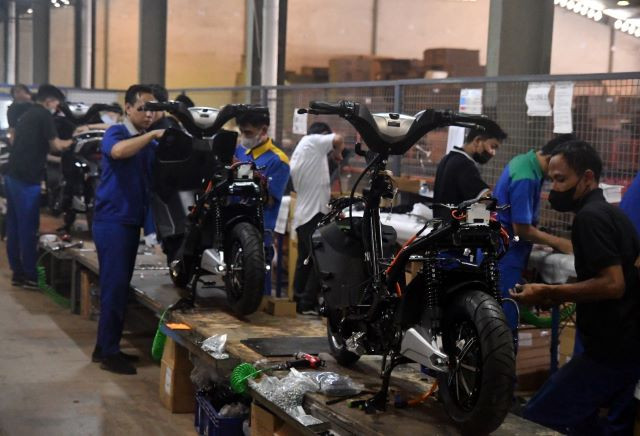Jokowi poll: Dissatisfaction reigns, but some trust remains
One year has passed since the Joko âJokowiâ Widodo administration started presiding over the country, following hotly competed legislative and presidential elections, and President Jokowi and Vice President Jusuf Kalla have had to face formidable challenges since their first day in office
Change text size
Gift Premium Articles
to Anyone

One year has passed since the Joko 'Jokowi' Widodo administration started presiding over the country, following hotly competed legislative and presidential elections, and President Jokowi and Vice President Jusuf Kalla have had to face formidable challenges since their first day in office.
The Cabinet they formed was a compromise amid heavy pressure exerted by coalition parties led by the Indonesian Democratic Party of Struggle (PDI-P). As a result, coordination and control of Cabinet ministers became major issues, issues that President Jokowi has yet to solve.
Some of his ministers display dual loyalties: To him as the President, with the highest constitutional power, but also to their respective party leaders. This kind of 'power-sharing' Cabinet also allots space to unsuitable or underperforming ministers.
There are instances, however, that provide ample reason to believe that the Jokowi administration may end with high marks by the end of its term. In spite of Jokowi's progressions and regressions, it should be noted that the public has become more critical of political processes.
The public seems also to understand that critical evaluation should not only be conducted on the executive branch of power, i.e. the President, but also on the political players that control the other branches of power, including the legislature, political parties and law enforcement.
In the eyes of the public, the performance of the President in this first year is a result of many other factors beyond the executive branch of power. In other words, in the eyes of the public, all political actors ' not only the President and Vice President ' should be held accountable for the country's experiences ' both good and bad ' over the past year.
The big picture
Doubts have been lingering about President Jokowi's ability to run the country given his outsider status, a new kid on the power block in Jakarta. Jokowi's path to power was quick and phenomenal, rising from mayor of a small city to the governorship of Jakarta, then to the presidency.
To his critics, there is nothing presidential in his political experience. His experience of governing the city of Surakarta and the province of Jakarta is not, in their view, sufficient, nor congruous with the presidential archetype: a national (and therefore Jakarta-based) leader au fait with the nitty-gritty of national politics.
Yet in truth, Jokowi is probably the embodiment of the future of Indonesia's political leadership. He is the fruit of a decentralization program that started in 1999, devolving power from Jakarta to the regions and ending more than 30 years of centralized government.
While the old-style leadership relied on a top-down approach to government, decentralization has brought in a new dynamic in power relations between the ruled and the rulers: good public service delivery coupled with a people-centered approach.
Jokowi and many other good local leaders understand the new reality of power relations; much of the aging elite, meanwhile, prefer to ignore or dismiss it.
Voters are increasingly critical and rational, partly thanks to the competitiveness of the 2014 elections. President Jokowi appears, though, to have won approval and trust from critical voters.
A nationwide opinion poll conducted by the Centre for Strategic and International Studies (CSIS) in October 2015 found that 48 percent of the public were dissatisfied with Jokowi's general performance in the past year, with 50.6 percent satisfied.
The poll discovered that respondents were unhappy with the administration's performance in three key areas: the economy, rule of law and the political situation. The maritime sector, meanwhile, was one area in which respondents expressed satisfaction at the administration's performance.
Almost 70 percent of respondents said that they were not satisfied with the administration's economic performance.
In addition, about 54 percent of respondents were not happy with the current political situation. In the area of rule of law, approximately 46 percent of the respondents said that they were not satisfied with the administration's performance.
Regarding the maritime sector, almost 60 percent of the respondents said that they were satisfied with the performance of the Jokowi administration.
At the same time, respondents said that they were happy with certain programs introduced by the administration, such as the Indonesia Smart Card (KIP), BPJS universal health care and the BPJS Ketenagakerjaan pension fund for workers.
About 56 percent stated that the KIP was useful, while 74 percent said that BPJS universal health care was useful and 62 percent said the same of BPJS Ketenagakerjaan.
____________________________________
The new law harbored one small, largely unnoticed glitch [...] that candidates in local elections must secure written approval to stand.
Arguably the poll's most important finding was that 80 percent of respondents said that they still trusted Jokowi, while about 75 percent said the same for Jusuf Kalla.
This indicates that regardless of their critical views about the performance in some areas, the public maintains a high level of trust in the President and Vice President.
Politically speaking, President Jokowi proved able to exert his will in at least four important areas.
First, within weeks of being sworn in, he boldly removed fuel subsidies without serious opposition from the House or the general public. No previous presidents have ever been able to take such swift and decisive action on fuel subsidies.
The decision lent hope that the new President would govern in accordance with principles of economic rationalism. President Jokowi was left with no option but to remove fuel subsidies in order to create fiscal space in the first few months of his presidency.
The decision was applauded by most economists as driven by a rational economic calculation, and was also perceived as a bold decision that provided a glimpse of Jokowi's potentially strong economic leadership.
Second, related to the first point, the passing of the revised state budget in February 2015 passed without serious opposition at the House of Representatives.
The removal of fuel subsidies a few months earlier gave Jokowi room to initiate infrastructure projects ' his stated top priority.
Third, the opposition force Red-and-White Coalition (KMP) was planning to revise the Local Election Law, looking to return to the old practice of indirect local elections with regional heads elected by provincial legislative councils, rather than direct election.
The public sided with the new President, putting pressure on the House to stick with direct elections at the local level.
In the first session of the new House in January 2015, the KMP was defeated, and a law mandating the government to retain direct local elections passed easily.
However, the new law harbored one small, largely unnoticed glitch, namely an article stipulating that candidates in local elections must secure written approval to stand from the Jakarta headquarters of nominating political parties.
While it is unclear who introduced the article, it seems that it was inserted based on a shrewd calculation. The article justifies and strengthens central party control of candidates contesting local elections, including the formation of coalitions needed to win elections and form local administrations.
If applied, it would pave the way for the formation of permanent coalitions from the national to the local levels.
Yet the article backfired against members of the KMP. Two opposition parties, Golkar and the United Development Party (PPP), have become embroiled in internal disputes resulting in dual leaderships, disputes arising at least in part from disagreement among party elites over whether to support the elected President or stay outside the government.
Fourth, the appointment of the new Indonesian Military (TNI) chief earlier this year was another landmark of President Jokowi's leadership.
According to the tradition of rotation, the new TNI commander should have come from the Air Force. President Jokowi, as the supreme TNI commander, however, decided to appoint Army chief Gen. Gatot Nurmantyo. This could have been construed as interference by the President, yet the appointment went unopposed by the House ' or, for that matter, the TNI.
In the CSIS survey, Jokowi's lowest marks come in rule of law, the fight against corruption in particular. This year's dogfight pitting the National Police against the Corruption Eradication Commission (KPK) is particularly instructive.
The saga began with the nomination of the new police chief. The public was puzzled by the apparent inability of President Jokowi to withstand pressure from the PDI-P, his own party, to nominate Comr. Gen. Budi Gunawan, and was witness to a period of flip-flopping on the part of the President, who eventually dropped Budi and plumped for Badrodin Haiti as the new police chief.
There is a very strong public perception that PDI-P chairwoman Megawati Soekarnoputri exerts strong influence over President Jokowi. More than 80 percent of respondents to the CSIS national poll thought that Megawati had more influence on Jokowi than any other political figure.
In the selection of the police chief, among many other cases, the PDI-P raised eyebrows by acting more
like an opposition party than the home of the President's colleagues and allies.
President Jokowi has slowly consolidated his power. He governs in a more democratic Indonesia, with multiple power centers.
It is a constitutional fact that as President, Jokowi is at the top of the nation's political pyramid, but it is a political fact that Jokowi is not the strongest figure within his own political party ' a fact that has defined the vicissitudes of his relations with the party over the past year.
Pressure to reshuffle the Cabinet, for example, came mostly from the PDI-P. It is very interesting to note that Jokowi eventually succumbed to the pressure and enacted a reshuffle, albeit limited.
Demands had mounted for Jokowi to replace his economic ministers because of their perceived underperformance; the critics seemed to forget that most of the economic ministers were handpicked by Jokowi himself, while other ministerial posts were distributed among the ruling coalition.
Shrewdly, Jokowi replaced only the coordinating economic minister; other economic ministers, with the exception of the trade minister, kept their posts. The President was sending a message that he still believed in his economic team.
Other political players
The CSIS survey detected widespread public dissatisfaction with other political figures and institutions, especially the House and political parties.
In the poll, the public rated the House poorly in the areas of lawmaking and budgeting. More than 52 percent of the respondents stated that the House had performed badly in terms of lawmaking, while 55 percent said the same of its budgeting capacity.
The House, indeed, ranked lowest in the question, 'Which state institution do you most trust?'. Fifty-three percent of respondents said they trusted the House.
The TNI, KPK and the President, meanwhile, secured a higher level of confidence with 90 percent, 80.8 percent and 79.7 percent, respectively. In other words, President Jokowi, against the House and opposition parties, has the upper hand in terms of public support.
Finally, it is interesting to note that public critical evaluation of the performance of the Jokowi administration does not necessarily translate into support for Prabowo Subianto, the loser in last year's presidential election.
To the question of, 'For whom would you vote, were the presidential election held today?' Thirty-six percent said that they would vote for Jokowi, while 28 percent said that they would vote for Prabowo.
Suffice to say that as of now, President Jokowi remains Indonesia's most powerful political figure.
The public has, it is true, stated loud and clear through a number of opinion polls that they are dissatisfied with the general performance of the administration.
Yet the public still maintains a high level of trust in the President, something that other political players seem unable to earn. The ball remains in Jokowi's court ' it is up to him now to fulfill the public's great expectations.
_________________________________
The writer is executive director of the Centre for Strategic and International Studies (CSIS), Jakarta.









